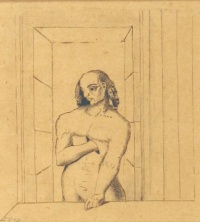Personal life
From The Art and Popular Culture Encyclopedia

|
"If a German philosopher dons a Nazi uniform in 1933 and endorses Hitler, you have to be extremely subtle, or extremely stupid, to conclude that this event sheds no light on his ideas." --Robert Fulford, 2002 |

|
Related e |
|
Featured: |
Personal life is the course or state of an individual's life, especially when viewed as the sum of personal choices contributing to one's personal identity.
Apart from hunter-gatherers, most pre-modern peoples' time was limited by the need to meet necessities such as food and shelter through subsistence farming; leisure time was scarce.
People identified with their social role in their community and engaged in activities based on necessity rather than on personal choice. Privacy in such communities was rare.
The modern conception of "personal life" is an offshoot of modern Western society. Modern people tend to distinguish their work activities from their personal life and may seek work–life balance.
It is a person's choices and preferences outside of work that define personal life, including one's choice of hobbies, cultural interests, manner of dress, mate, friends, and so on. In particular, what activities one engages in during leisure-time defines a person's personal life. For instance, a typical American has about five hours of leisure time per day, more than half of which is spent watching TV. Religious authorities, moralists, managers and personal-development gurus have seized on the concept of an individual life as a fulcrum for potential control and manipulation.
The virtues of personal life are to be regarded both from the side of control and from the side of culture. On the one hand the varied impulses and desires have to be regulated so as not to interfere with the realisation of the moral ideal.
People in Western countries, such as the United States and Canada, tend to value privacy. Privacy includes both information privacy and decisional privacy; people expect to be left alone with respect to intimate details of their life and they expect to be free from undue control by others.
See also
- Meaning of life
- Personal identity
- Human condition
- Reality
- Maslow's hierarchy of needs
- Life stance
- Physical quality-of-life index
- Quality time
- Real life
- Avocation
- Work-life balance
- Everyday life
- Lifestyle (sociology)
- Personal
- Simple living
- Human ecology
- Lifeworld
- Secret life
- Privacy
- Sexual life
Further reading
- The Psychopathology of Everyday Life (1901) – Sigmund Freud
- Critique of Everyday Life (1947) – Henri Lefebvre
- The Revolution of Everyday Life (1967) – Raoul Vaneigem
- The Practice of Everyday Life (1974) – Michel de Certeau

